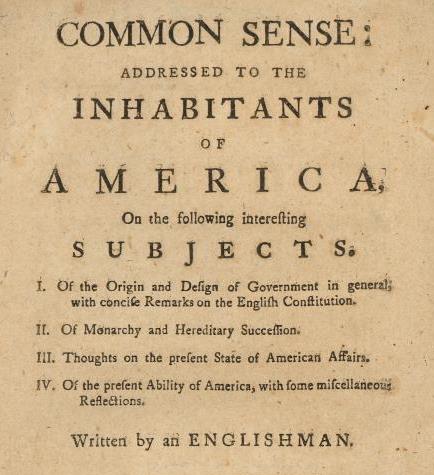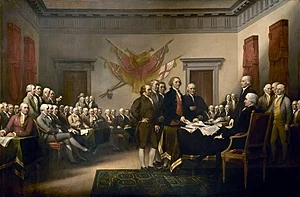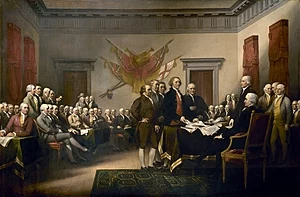I wonder if millennials even know who Thomas Paine was.
In the early 1960s I studied American History in college, as a required core subject, courses even engineering students from India had to take in order to get a degree.
I’m not sure that’s any longer the case, but I still remember the textbook, Commager and Morison, Growth of the American Republic. (One was a liberal, the other an un-hyphenated WWII Navy historian, “conservatism” as we know it not yet rooted in America’s political vocabulary. As a team, they soon parted company over the Vietnam War, which took up much of the ink in America in the second half of that decade. But I’m not sure if they called one another names because of it. It was a different time.)
Thomas Paine’s Common Sense was mentioned in that textbook as one of the accelerants of the American Revolution.
Some of the Founders didn’t like Thomas Paine very much. Gouverneur Morris, of a wealthy New York family and drafter of the Constitution’s Preamble, thought about him almost entirely in terms of his breeding. For one, Paine was an upstart with no firm roots in America. He’d only come to America in 1774, at age 37, and then, on a letter of introduction from Benjamin Franklin, who he’d sought out in London.
And how much American colonials knew of his failed business endeavors, two marriages, and opinionated tom-foolery at the local taverns back in England I can’t say. While some men chased the company of women, Tom Paine chased the company of spirited conversation, often laced with copious amounts of spirits. If there were Germans in those alehouses they would likely have called him a Besserwisser, or know-it-all. He was self-educated, but rigorously so, a voracious reader, an “idea-guy” not just in political philosophy but in science. He was a tabula rasa who never seemed to stop thinking, his mind seeming to always be one step ahead of his mouth and two in front of his pen. So it figures that not everything he wrote made sense to a lot of people. So over the course of his life it probably earned him as many enemies as friends, for when he died in 1809, at age 72, in New York, only six people attended his funeral.
As an object of study he is as worthy as the other Founders, but not for his thinking as much as his way of thinking, which is why he connected so easily with the ordinary America colonials.
To average Americans Thomas Paine was sort of a one-hit wonder. His greatest and most important contribution to American history occurred in only a few short months in 1776, when he was only about half the age as when he died.
But oh, my, what he did in 1776.
Paine’s lack of a resume that might impress colonial highbrows didn’t matter much because he by-passed them, going out and capturing the minds of the people of the colonies directly, without “benefit of clergy” as the political establishment even of that day considered itself to be. Since we’ve witnessed this same phenomenon in our own lifetime, we better have a sense of what it might have been like in 1776.
Just as the Continental Congress began thinking about a declaration of independence, trying to figure out how to go about doing it, and thinking about how best to approach “the people” with it, Thomas Paine took most of their options away by simply giving the colonists a 50-page pamphlet entitled Common Sense and laying the case for independence in their lap in plain-spoken English, using everyday logic, reason and common sense. Hence the title.
For magnitude of his book’s impact, consider this:
The American colonies had about 5 million people, mostly shopkeepers and farmers, and their families. Most were literate, i.e., they could read and write. But they were light on the sorts of reading we send our kids off to college to learn; history, philosophy and the arts. Still Common Sense sold 150,000 copies in just a few months in 1776, without the benefit of advertising, or a Barnes & Noble store, or Amazon. And by an nnonymous “Englishman” author.
It was only 50-pages, a pamphlet actually, and easy to read. All the modern Left polemicists, and sadly, a few at former-conservative sites who have taken up the drumbeat about the general stupidity of the American rank and file, would have snided that 50 pages was probably the limits of their attention span. Even a modern political writer (make your own list) or publisher’s editor would stretch that out to at least a hundred pages, probably more, but more to impress their own kind, while in the process losing about 75% of the people who would read it.
Better the applause of a thousand than the edification of a hundred thousand.
There are best sellers and there are best sellers. With the exception of the Bible and possibly Margaret Mitchell, no American writer could even conceive of a writing having the impact of Common Sense. Its 150,000 copies would be the equivalent of 13 million in book sales today.
Paine’s key to success would be seen today as a shortcoming by editors. Unlike modern non-fiction Common Sense wasted almost no space with flourishes or extraneous analysis. It zeroed in on things that mattered to an average family; in their relationship to their property, their safety, their ability to work and engage in commerce, (producing, buying and selling) and their general God-given right to decide for themselves how they wanted to be governed.
Even Mick Hensley, who dropped out of school when he was 16, but who first broke my nose twice because he caught me in a lie…yes, twice…(I still mention him in my prayers) would have understood what Tom Paine was writing about.
Common Sense was not a sermon. Nor was it a list of grievances. It was a line-by-line list of things that were important in peoples’ everyday lives, and of the 150,000 copies sold, I’m sure there was a limitless number of variations in how those 50 pages were underlined, each according to the readers’ individual priorities.
Thomas Paine’s bottom line, which his readers agreed with in unison, was “Declare Independence!” and “Start a revolution if your have to, in order to achieve it.”
Larry Schweikart and Michael Allen’s A Patriot’s History of the United States, over 800 pages in my 2007 edition, is laid out in the same commonsensical approach to American history as Paine laid out America’s First Cause, every section a stand-alone element in a progression of thousands of sequenced elements (called “connecting dots” for those of you who know how to connect more than two) that have gone into creating our still evolving passing show in America.
At the bottom of that History is the “Founding”, and there you’ll find Thomas Paine’s Common Sense. Schweikart and Allen gave over an entire section of their History to its impact as to how the Declaration would come about. Let’s just say the people “fast tracked” the Revolution because of it. Petitions poured into the Continental Congress based on the stirrings of their citizens because of this book. Then delegations to Philadelphia received instructions to support independence by May, 1776, just a few months after Common Sense hit then bookstands. By June the Continental Congress named a commission to come up with a draft declaration, which, after some arm-twisting and back and forth, Thomas Jefferson’s venerated lines. “We hold these truths to be self-evident…” along with a lengthy indictment against the King, were first read and ratified, July 4, 1776.
I’ve been lucky enough to see soulless communist atheists cry the first time they heard those words…in the USSR. So those words still matter.
I have two purposes here.
The first is to provide the millions of Americans who have only come back on board the patriot train in the past couple of years with a simple guide they can read and underline that lays out MAGA in the clearest and most logical way.
But it’s more than a guide. It’s a handshake with nearly 250 years of Americans who have gone before us, with those original colonists who had read the very same words…not something similar, but the very same words…and used the same logic, and connected the same dots we do today as we remind ourselves why this 250-year old venture in human liberty is still worth fighting for, and worth saving.
It doesn’t get any more connected than that.
I propose a special edition of Common Sense, to be sold in conjunction with the 2020 election, with liner notes from a select short list of prominent conservatives.
Publishers would have to be found, the select list of contributors would have to be enlisted, none of which I can do, but that’s the general way I envision it.
Only notable Americans could make this happen, and I know very few. So, maybe you can help.
Purpose #2: We are in the middle of the second generation that has never heard of Common Sense, much less its practice of logic in establishing the four corners of liberty as people still see it from the bottom, looking up. They make up America’s core, and it is that core that is finally within the Left’s gunsights.
Since the Revolution that had always been the fundamental understanding between our leaders and our people. That handshake. Only it has become a little limp-wristed in recent years.
We probably have the finest assemblage of Americans since the Founding who understand this deep need in our culture to restore this handshake.
While it may take a few years to run the political enemies of our Republic back into the bowels of society from whence they came, it will require much longer to restore the American culture to our school rooms, from middle-school through college, and the way of thinking found in Common Sense that can secure that handshake.
It will have to be a battle fought on many fronts, simultaneously, for many years, something that might earn several pages in a future edition of A Patriots History, subtitled “Great Awakening”.
I have long been a proponent of Schweikart and Allen’s History becoming the preferred text for public schools. Richard Dreyfuss, an old-fashioned liberal (I think) as I once was, has his own Civics Initiative which I wrote about a couple of years ago. He has the organization to help in guiding programs that could go well beyond the current generation. But I’m sure there are others.
- * * * *
These are my thoughts. But No one is going to go out and buy a special edition of Paine’s Common Sense edited by Vassar Bushmills. Not when much better-known writers can put their imprimatur on it. I just consult.
I’d simply like to get this ball rolling.
Feel free to comment, or contact me privately at VassarB@gmail.com or I’ll keep you posted on Twitter @BushmillsVassar. We need to have the ball rolling by Fall, 2019.
After all, the book is already written.
As always I appreciate any contribution to our Veterans Program at VeteranTales



